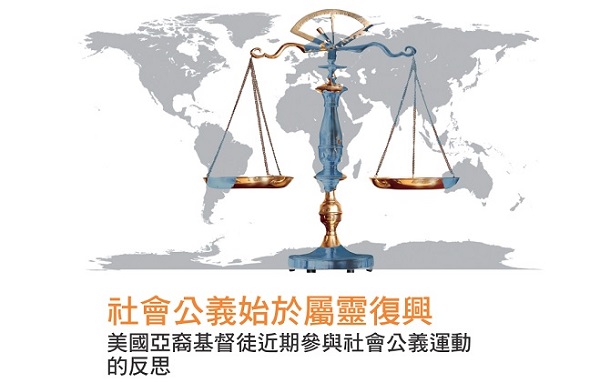Social justice begins with spiritual revival
Reflections on Asian American Christians’ recent participation in social justice movements
Translate/Add more

Over the past 20 years, I have worked in conservative, Bible-abiding Chinese churches in North America, and I have found that members of the congregation rarely participate in social justice movements or discuss related issues. Of course, the key is "where is my home?" Overseas Chinese churches are less likely to help the local poor or donate to the victims of Hurricane Katrina in 2015. Instead, they are actively raising funds for the earthquake in Sichuan or Taiwan. However, with the recent rise in "anti-Asian" hate crimes, the Chinese community in North America seems to be more actively involved in racial issues in the United States. Since God requires all those who follow Him to "do justice, love mercy, walk humbly with God," I hope that this article will cause Christians everywhere to further reflect on their participation in the social justice movement.
Politics, universal human rights?
There have never been "political" or "universal" human rights. "Equality" is a concept rooted in Christian theology, especially in the New Testament - Paul calls for tearing down the walls of hatred (see Ephesians 2:14); we are all God's beloved children, and He is no respecter of persons. Anyone has access to God (see Acts 10:34).
When examining all cultures and their histories, it is clear that "equality and human rights" are never "universal." Any ethnic group/race/country/empire with dominant military, economic, and cultural advantages will always conquer minority groups by virtue of its power and majority. We can see this in the treatment of Native Americans, the Rohingya Muslims in Myanmar, and other precedents.
Simply put, with the exception of biblical Christianity, theology has always been used as a tool to legitimize "rule" (such as the Mandate of Heaven in Chinese history, or the Hindu caste system, which also happened in Christianity), rather than bringing about true equality and equal rights for racial minorities. Therefore, Christians’ motivations for pursuing social justice must be based on Christ’s compassion and acceptance of all people, rather than adhering to the currently popular politically correct agenda on racism.
To achieve equality and justice?
Ultimate equality and justice can only be achieved in the hope of Christ’s return. Even though Western society has deep roots in Christian theology, it was not until the rise of the civil rights movement that the people's political power was equalized. In short, it's an experiment that's only 60 years old and has been plagued with problems from the beginning. Princeton University professor Max Stackhouse summed it up this way: "In intellectual honesty, we must acknowledge the fact that basic Western human rights principles that are regarded as secular, except those derived from mainstream religions based on the Bible, Nothing else." It is on this biblical basis that modern Western ethics and social justice can flourish.
However, as Christians we must remember that no matter how hard we try, we can never bring heaven to earth. Ultimately, true justice and equality can only be realized after the return of Christ. It is this hope that keeps us motivated and energetic to use the power of the gospel to transform society. It is a serious mistake to regard social justice issues alone as the ultimate goal. On the contrary, when people have Christ-like kindness, what will naturally emerge is a just and equal society. As we will see from the next point, repentant and renewed Christians have been the driving force behind the truly biblical social justice movement in recent years.
Change begins with repentance and revival
Christian Western social movements and advances in recent years have been the result of spiritual revival. Historians correctly attribute the abolition of slavery to the Second Great Revival (1790-1840), the Third Revival leading to the women's rights movement and Prohibition (1855-1930), and the Civil Rights Movement to Dr. King's efforts and Other evangelical movements from 1960 to 1980. “The idea of human dignity and the respect that everyone deserves is not something that comes out of nowhere.” (Lauren and Michael McAfee, 2019) All social justice movements for the marginalized are accompanied by Christ’s deep compassion for the oppressed. Before the transformation of one’s heart and society’s political form, one must truly repent of one’s personal and institutional sins.
The current "war on racism" is led not by a Christian spiritual revival but by liberal secularists who are often hostile to Christianity. The recent social justice movement against racism does not stem from a spiritual revival, from a deep awareness and repentance of our sins, or from a Christian theological belief in racial equality before God, our Creator.
Instead, the movement asserts universal "equality" and "rightness" that have nothing to do with a biblically correct Christian epistemology. In the critical theory of postmodernism, liberal secularists reject religious metanarratives (discourses about truth and its models) on the one hand, and assert the universality of human rights on the other, while regarding the "inner" nature of human beings. value, without a coherent argument.

▲Just as Jesus’ body was broken, are followers of Christ also willing to humble themselves, reflect, and serve those who are persecuted?
Eternal Impact, Biblical Social Justice
The final result of this anti-racist movement without a Christian ethical foundation is to demonize and objectify racists, which will ultimately lead to another self-justification. Therefore, in the minds of liberal secularists, anything they do not approve of is a sin. As a result, the pervasive "cancel culture" dominates today's popular culture. When someone violates the tenets of elite liberal secularist values (such as racism, climate change, LGBTQ rights, etc.), they become irredeemable monsters and are labeled with various labels, such as bigotry, racial prejudice, Being uneducated...etc. creates a very dangerous stigma to society.
This is not the gospel and Christ’s own practice. The gospel is never about pointing out, shaming, or excluding the "sins" of others. When Chinese Americans face racism, instead of using the weapons of the world - by demonizing racists, or hoping for political or legal protection - we must return to the almighty, just and loving God and admit that we are Sinners – He loves us and holds us despite our sinfulness.
In fact, in the church we must start asking - When have I treated someone unfairly because of the color of their skin or other biases? Furthermore, in this gospel of love, forgiveness is always received when one truly repents. Therefore, according to Christian ethics, what Christians should do in the social justice movement is not to set up another set of self-justifying and arrogant standards, but to meekly and humbly reflect how Christ served the marginalized and oppressed.
Chinese Americans responded to growing hostility and violence in their communities, trying to protect themselves through political voices and legal processes. But pray that God will allow Chinese-American Christians, and all followers of Jesus, to not stop at these steps, but to use this opportunity to begin to honestly reflect on their own racism and ethnocentrism, as well as their treatment of other peoples near and far. dilemmas and experiences, whether there is a lack of compassion and empathy.
Only when we ourselves and the church are spiritually revived through repentance can Chinese-American Christians and all followers of Jesus begin a biblical social justice movement with eternal impact.
Further reading
本刊63期〈Christ's political path〉;〈Where to go?〉.
Cancel culture:
When the words and deeds of public figures or companies trigger criticism and boycotts, many original fans choose to "cancel" and stop following them on social media, which may even cause job opportunities and personal credibility to be "cancelled."
Some people affirm the accountability effect of "cancel culture" and argue that although individuals have the freedom to speak and act, they also need to bear the consequences. However, "cancel culture" sometimes approaches censorship, and any "politically incorrect" speech may lead to excessive criticism or even complete silence.
(參考〈「取消文化」當道,意見領袖成風向標,恐帶來哪些危險?〉,換日線;〈取消文化是甚麼?你要知道的一個網絡新詞〉BBC。)
 Rev. Dr. Peter Wang, Doctor of Pastoral Studies from Gordon–Conwell Theological Seminary. Pastor Wang immigrated to the United States from Taiwan when he was 14 years old. He has more than 20 years of pastoral experience and has served in various roles, such as director of mission agencies, founder of church plants/gospel agencies, and church pastors. Pastor Wang has a strong commitment to emotionally healthy spirituality, church leadership and organizational development, postmodern evangelical outreach, church planting ministry, and more. Currently, he is the Director General of CBM (Chinese Bible Mission) in the United States. Participates in teaching, consulting, and assisting in outreach ministries in churches, seminaries, and Christian non-profit organizations.
Rev. Dr. Peter Wang, Doctor of Pastoral Studies from Gordon–Conwell Theological Seminary. Pastor Wang immigrated to the United States from Taiwan when he was 14 years old. He has more than 20 years of pastoral experience and has served in various roles, such as director of mission agencies, founder of church plants/gospel agencies, and church pastors. Pastor Wang has a strong commitment to emotionally healthy spirituality, church leadership and organizational development, postmodern evangelical outreach, church planting ministry, and more. Currently, he is the Director General of CBM (Chinese Bible Mission) in the United States. Participates in teaching, consulting, and assisting in outreach ministries in churches, seminaries, and Christian non-profit organizations.
